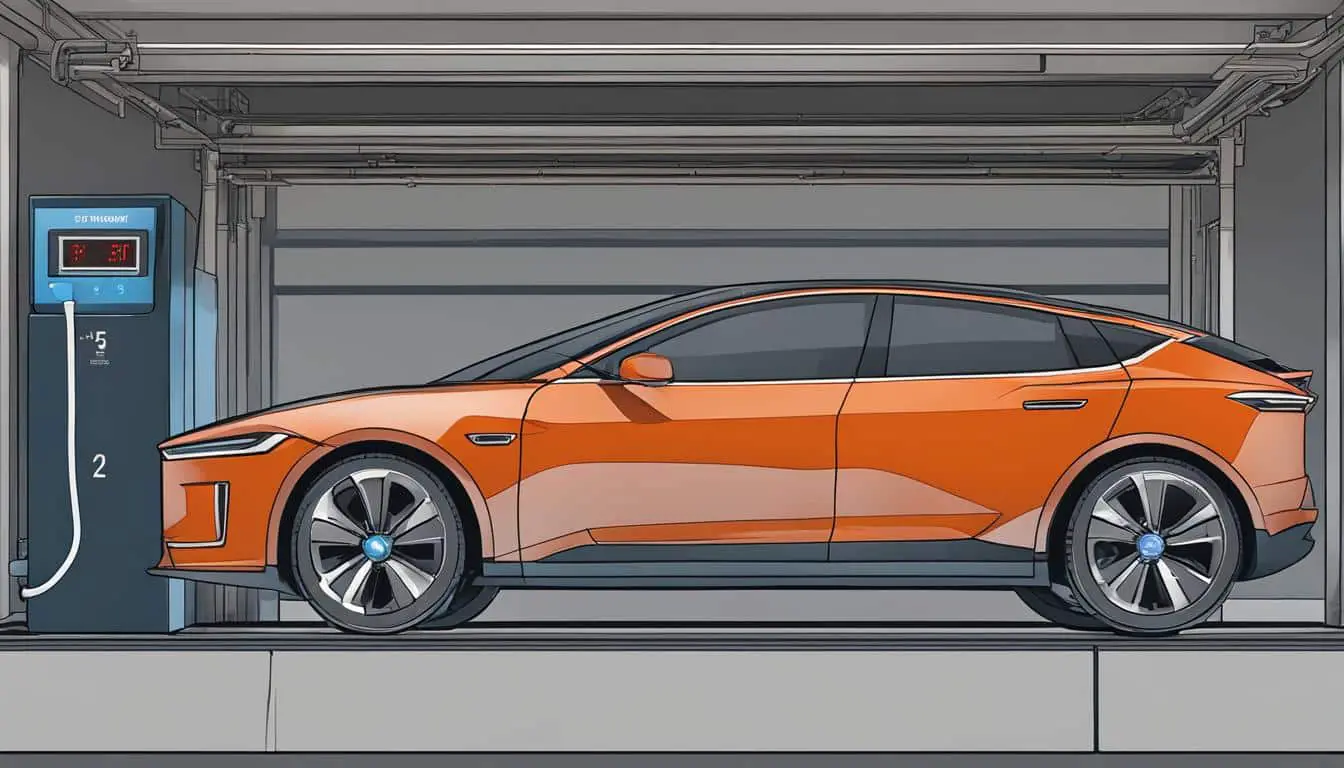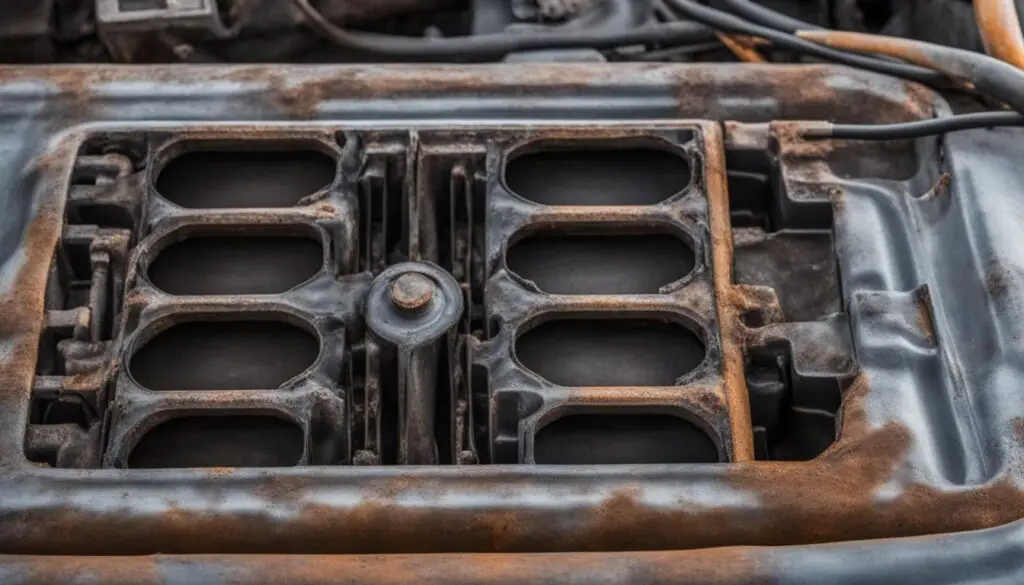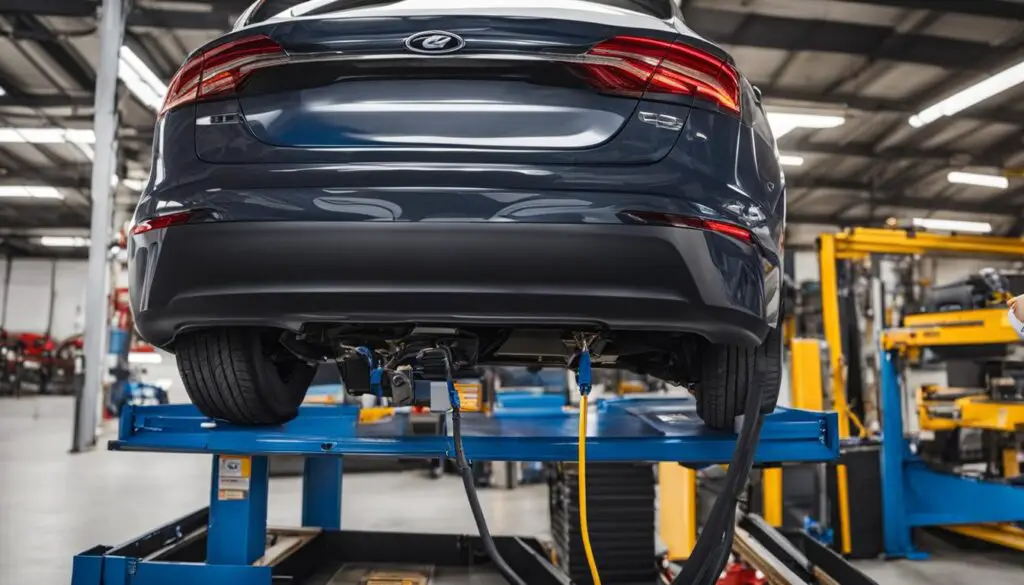
Essential Maintenance Tips for Your Electric Vehicle’s Battery
I’m excited to share with you some essential tips for maintaining your electric vehicle’s battery. Electric vehicles offer numerous benefits, including lower emissions and reduced fuel costs. While they require minimal routine maintenance compared to traditional cars, it’s important to understand that proper battery maintenance is still necessary to ensure longevity and optimal performance.
An electric vehicle battery is a crucial component that powers the electric motor and accessories. Understanding how it works and implementing the right maintenance practices can enhance its lifespan and maximize its potential. Let’s delve into some important tips to keep your electric vehicle’s battery in top shape.
Key Takeaways
- Proper maintenance is essential for the longevity and optimal performance of your electric vehicle’s battery.
- Avoid overcharging the battery and aim to keep it at around 80% charge.
- Limit the use of Level 3 chargers, as they generate more heat and can impact the battery’s health.
- Store your vehicle in mild climates and avoid extreme temperatures to preserve the battery’s longevity.
- Follow the manufacturer’s guidelines and recommendations for charging and maintenance.
Understanding How Electric Car Batteries Work
Electric car batteries are crucial components that store and provide energy to power the electric motor and various accessories in an electric vehicle. These batteries work differently compared to traditional gasoline or diesel engines, relying on the stored electrical energy to propel the vehicle.
There are different charging methods for electric car batteries, each with its own characteristics and charging speeds. These methods include:
- Level 1 Charging: This method involves plugging the electric vehicle into a standard household outlet. Level 1 chargers typically deliver a charging rate of 2-5 miles of range per hour of charging.
- Level 2 Charging: Level 2 chargers require a 220-volt charger, which is commonly found in garages or parking lots. This charging option provides a faster charging rate, typically delivering 10-60 miles of range per hour.
- Level 3 Charging: Also known as DC Fast Charging, Level 3 chargers utilize a 480-volt DC charger and offer rapid charging. This option can quickly charge electric car batteries, providing up to 80% charge within 30 minutes.
Electric car batteries have different capacities and ranges based on their construction and charging methods. The battery range refers to the distance an electric vehicle can travel on a full charge. Factors such as the vehicle’s efficiency, driving conditions, and battery capacity affect the range.
“Electric car batteries are at the heart of an electric vehicle’s power system, delivering the necessary energy to propel the vehicle and operate its various components.”
Understanding how electric car batteries work is essential for maximizing their performance and efficiency. By utilizing the appropriate charging methods and understanding the factors that affect battery range, electric vehicle owners can make informed decisions to optimize their driving experience.
The Construction of Electric Car Batteries
Electric car batteries are typically made up of several smaller battery cells. These cells are connected in series or parallel configurations to achieve the desired voltage and capacity. The most common type of battery used in electric vehicles is the lithium-ion battery due to its high energy density and longevity.
| Battery Type | Advantages | Disadvantages |
|---|---|---|
| Lithium-Ion | High energy density, longer lifespan | Higher cost, potential for thermal runaway |
| Nickel-Metal Hydride (NiMH) | Lower cost, proven technology | Lower energy density, shorter lifespan |
| Lead-Acid | Lowest cost, widespread availability | Heavy, lower energy density, shorter lifespan |
The table above provides a comparison of different electric car battery types, highlighting their advantages and disadvantages.
Maintenance Tips for EV Batteries
While EV batteries are designed to be essentially maintenance-free, there are certain measures you can take to ensure their longevity and optimize their performance. By following these maintenance tips, you can prolong the lifespan of your EV battery and maximize the driving range of your electric vehicle.
1. Avoid Overcharging
One of the most important maintenance practices for EV batteries is to avoid overcharging. Contrary to popular belief, it’s not necessary to constantly charge your battery to 100%. In fact, keeping your battery at around 80% charge can help extend its lifespan. Most EVs come with built-in charging controls that allow you to set charging limits, so be sure to take advantage of this feature.
2. Limit the Use of Level 3 Chargers
Level 3 chargers, also known as DC fast chargers, can provide rapid charging to your EV. However, they also generate more heat, which can potentially impact the health of your battery. To avoid excessive heat build-up, it’s recommended to limit the use of Level 3 chargers and opt for Level 1 or Level 2 charging whenever possible. This will help protect your battery and maintain its overall health.
3. Store Your Vehicle in Mild Climates
Extreme temperatures can have a negative impact on the performance and lifespan of your EV battery. Whenever possible, park your electric vehicle in mild climates to avoid subjecting the battery to extreme heat or cold. Additionally, if you live in an area with extreme weather conditions, consider using a garage or carport to provide additional protection for your vehicle.
4. Regularly Inspect and Clean the Battery
Periodically inspecting and cleaning your EV battery can help prevent corrosion and maintain optimal performance. Check for any signs of damage or leaks and clean the battery terminals using a damp cloth or a battery cleaning brush. This will ensure a secure connection and efficient power transfer.
“Following proper maintenance practices can significantly extend the lifespan of your EV battery and ensure optimal performance.”
By following these maintenance tips, you can ensure that your EV battery remains in top shape and continues to deliver reliable performance. Remember that each electric vehicle may have its own unique maintenance requirements, so it’s always a good idea to consult your vehicle’s owner manual or contact the manufacturer for specific recommendations.
| Maintenance Tips for EV Batteries | |
|---|---|
| Avoid overcharging | Keeping your battery at around 80% charge can help extend its lifespan. |
| Limit the use of Level 3 chargers | Excessive heat generated by Level 3 chargers can impact battery health. Opt for Level 1 or Level 2 charging whenever possible. |
| Store your vehicle in mild climates | Avoid subjecting the battery to extreme temperatures by parking in mild climates or using a garage or carport. |
| Regularly inspect and clean the battery | Check for damage or leaks and clean battery terminals to ensure a secure connection. |
Battery Degradation and Lifespan
Battery degradation is a natural process that occurs over time as the cells in the battery wear out. It is influenced by various factors, including frequent charging, extreme temperatures, and the number of charging cycles the battery goes through. These factors can lead to a reduction in the battery’s capacity and overall performance.
While it is difficult to predict the exact lifespan of an EV battery, following proper charging and maintenance practices can significantly extend its longevity. By adopting good charging habits, such as avoiding overcharging and keeping the battery at around 80% charge, you can minimize the stress on the battery and slow down the degradation process.
Additionally, extreme temperatures can have a detrimental effect on battery health. It is important to store your electric vehicle in temperate climates and avoid exposing it to prolonged periods of extreme heat or cold. Extreme temperatures can accelerate battery degradation and reduce its overall lifespan.
Evaluating the number of charging cycles is also crucial in understanding the battery’s remaining lifespan. The more charging cycles a battery goes through, the more it will degrade over time. By limiting unnecessary charging cycles and optimizing charging patterns, you can help maximize the lifespan of your EV battery.
“Proper maintenance and charging practices can significantly extend the lifespan of an EV battery.”
It’s important to note that EV batteries come with warranties from manufacturers, typically ranging from 8 to 10 years or a mileage limit. These warranties provide assurance and compensation in case of battery-related issues. However, it’s always advisable to consult the specific warranty terms provided by your EV manufacturer for accurate details on coverage and limitations.

Warranty and Replacement Costs
When it comes to electric vehicle (EV) batteries, it’s important to understand the warranty coverage and potential replacement costs. EV batteries often come with separate warranties from the overall vehicle warranty. These battery warranties are set by automakers and typically range from 8 to 10 years or may be based on a specific mileage limit. It’s crucial to review the warranty details provided by the manufacturer to know the exact coverage and definition of battery failure.

Having a clear understanding of your EV battery warranty can help you make informed decisions about maintenance, repair, and replacement.
When it comes to replacing an EV battery, the cost can vary depending on several factors, including the battery’s age, capacity, and model. Refurbished battery packs for older models can range from $2,000, while higher-capacity units in newer models can exceed $10,000. It’s worth noting that these are rough estimates, and the actual cost may vary based on the manufacturer, installation, and other factors.
Refurbished Battery Cost Examples:
| EV Model | Approximate Cost |
|---|---|
| Nissan Leaf (2011-2015) | $2,000 – $4,000 |
| Tesla Model S (2012-2015) | $7,000 – $10,000 |
| Chevrolet Bolt (2017-2020) | $8,000 – $10,000 |
It’s important to consult with a professional technician or dealer who specializes in EVs to get accurate pricing and warranty information specific to your model. They can provide you with the most up-to-date information and guide you through the process of battery replacement if necessary.
Conclusion
To prolong the lifespan of your electric vehicle’s battery, it is crucial to prioritize proper maintenance and care. By following recommended charging practices, avoiding extreme temperatures, and adhering to the manufacturer’s guidelines, you can significantly enhance the performance and longevity of your EV battery.
Regular inspections, tire rotations, and fluid checks also play a vital role in ensuring the overall health of your vehicle. These routine maintenance tasks go hand in hand with battery maintenance and contribute to a seamless driving experience.
Remember, implementing these electric vehicle battery maintenance tips not only maximizes the lifespan of your battery but also reinforces the sustainability and efficiency that come with electric vehicle ownership.
FAQ
How often does an electric vehicle battery need maintenance?
Electric vehicle batteries require minimal routine maintenance compared to traditional gasoline and diesel cars. However, it is important to follow proper maintenance practices to ensure the longevity and optimal performance of the battery.
How do I charge an electric car battery?
There are different ways to charge an electric car battery. Level 1 charging is done through a household outlet, Level 2 charging is done with a 220-volt charger commonly found in garages, and Level 3 charging is done with a 480-volt DC charger for rapid charging.
How long does an electric car battery last?
The lifespan of an electric car battery varies depending on its construction and charging methods. Factors such as frequent charging, extreme temperatures, and the number of charging cycles can impact the battery’s lifespan.
How can I prolong the lifespan of my electric vehicle battery?
To prolong the lifespan of your electric vehicle battery, it is important to avoid overcharging and aim to keep it at around 80% charge instead of constantly charging it to 100%. Limiting the use of Level 3 chargers and storing the vehicle in mild climates can also help preserve the battery’s longevity.
What is battery degradation?
Battery degradation is a natural process that occurs over time as the cells in the battery wear out. Factors such as frequent charging, extreme temperatures, and the number of charging cycles can contribute to battery degradation.
What is the lifespan of an EV battery?
It is difficult to predict the exact lifespan of an EV battery. However, following proper charging and maintenance practices can significantly extend its lifespan. EV batteries typically come with warranties ranging from 8 to 10 years or a certain mileage limit, depending on the manufacturer.
What are the warranty and replacement costs for EV batteries?
EV batteries often come with separate warranties from the overall vehicle warranty. These battery warranties vary among automakers and can range from 8 to 10 years or a specific mileage limit. The cost to replace an EV battery can range from $2,000 for older models to over $10,000 for higher-capacity units in newer models.
How can I maximize the performance and longevity of my EV battery?
Proper maintenance and care are essential for extending the lifespan of an electric vehicle battery. By following the recommended charging practices, avoiding extreme temperatures, and adhering to the manufacturer’s guidelines, EV owners can maximize the performance and longevity of their battery. Regular inspections, tire rotations, and fluid checks are also important to ensure the overall health of the vehicle.
Where can I get accurate pricing and warranty information for my EV model?
It is important to consult with a professional technician or dealer for accurate pricing and warranty information specific to your EV model. They can provide you with the most up-to-date information regarding pricing and warranty coverage for your EV battery.
